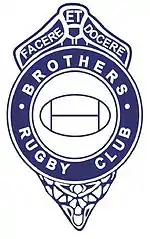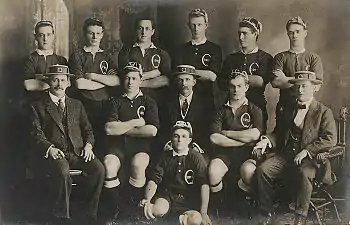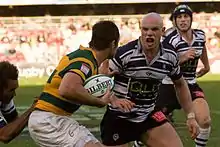Brothers Old Boys
The Brothers Old Boys is an Australian rugby union club, based in Brisbane, Queensland. The team currently competes in the Queensland Premier Rugby competition against nine of the states best Rugby Union clubs. The club was established in 1905 and has won 28 'A' Grade premierships since. They have produced 231 Queensland and 85 Internationals including 78 Wallaby players over the last century.
 | ||
| Full name | ||
|---|---|---|
| Union | Queensland Rugby Union | |
| Founded | 1905 | |
| Region | Brisbane | |
| Ground(s) | Crosby Park | |
| President | David Hine | |
| Coach(es) | Rod Seib | |
| Most caps | B. O’Connell (230)[1] | |
| ||
| Official website | ||
| www | ||
History
First golden era
The Brothers Old Boys Rugby Union Club was formed at a meeting held in 1905 by old boys of Gregory Terrace, Nudgee College and St James College who wanted a Rugby club that 'old boys' (past students) could all play for. It was further decided at this meeting to play in the school colours, blue and white hoops. These were the St Joseph's College Gregory Terrace colours of the time. In 1905, the team played in plain hoops but the Scottish supplier incorrectly sent navy and white irregular hoops ('butcher stripes') for the 1906 season and the club has maintained this jersey ever since.
In 1907, after only the second year in the Brisbane Premier Rugby competition, Brothers won their first premiership defeating Valleys 18 – 8. Brothers next string of success was titled the 'First Golden Era' when they won premierships in 1911,12,13,15 and 1919. During this period the club was so strong that in 1914 they fielded two teams in the competition Brothers 'A' & 'B'. The end of the 1919 season saw the demise of Rugby Union in Queensland, Rugby league became the 'code of choice' and Brisbane Premier Rugby came to a halt.

Queensland versus New South Wales interstate clash
In 1913, nine Brothers players represented Queensland in the interstate clash in Sydney and helped the team to a 22 – 21 victory. In addition to Pat Murphy and Jimmy Flynn these players were M. J. McMahon, R. McManus, Hugh Flynn, Vin. Carmichael, Tom Ryan, Bill Morrissey and Joe Russell. Another Brothers player to be selected for state and country during these years was R. 'Clinker' Birt.
Second golden era
Rugby Union was re-introduced in Queensland in 1929 and Brothers returned to the QRU in 1930, but it wouldn't be until 1945 that it tasted success. They secured their first trophy in the senior competition since the recommencement of competition with a 13 – 6 victory over University in the final of the mid-season Tom Welsby Cup in 1945. Brothers went on that year to contest the premiership final but went down to none other than arch rivals University. It was the start of a bright period for the club, a 'second golden era' saw premiership wins in 1946, 1949, 1950, 1951 and 1953.
Brothers become the first club in Brisbane to have their own ground at Crosby Park, Albion. The original arrangement began with the QRU as lease holder in 1949 but Brothers took over the lease in their own right in 1951. Prior to the move the players would train under lights at the local public New Farm Park.
The success of the late 1940s and early '50s was not repeated for more than a decade, except for a premiership win in 1959. Following the 1959 premiership win things reached possibly the lowest point ever for the club. The year 1963 saw the club struggle to field a competitive team but things began to turn around in 1964 with Premierships in 1966 and 1968.
Third golden era
The 1970s marked the start of a 'third golden era' for the club as 'A' grade premierships continued in 1971, 73, 74, 75, 78 and then an unbroken and unprecedented record of five in a row from 1980 to 1984. This gave Brothers ten premierships in a 14-year period from 1971 to 1984, a remarkable achievement. The resurgence of Brothers contributed greatly to the Queensland Rugby revival. Brothers other success in the 1980s came in 1987 when they defeated Souths 20-19.
1990s to present day

The Premiership successes had been missing from the club since 1987, and the first and only grand final appearance in the '90s came in a loss to rivals University in the 1990 Grand Final. Brothers continued to produce quality players such as past Wallaby captain John Eales, former Queensland Reds captain and Australian Vice Captain Elton Flatley and fellow Reds players David Croft and Sean Hardman along with the recently retired Glen Panoho. In 2005, the club celebrated its Centenary and the following year after a long 16 years absence reached the Grand Final, losing 23–22 to Wests in the 2006 Grand Final. Once again in 2008, Brothers would lose another Grand Final, this time to Easts by the barest of margins falling short 21 points to Easts 22. The defeat would not last long in the memories for the club as they made back-to-back grand finals and in September 2009, after a long awaited 22-year drought, Brothers won their 27th premiership by defeating Souths 26–19. In 2016, Brothers won their 28th premiership defeating traditional rivals University 31-28.
Rivalry with 'The Red Heavies'
The long tradition of clashes with University (nicknamed 'The Red Heavies' or 'The Students') first began in senior competition on 8 June 1912, with Brothers running out victors 24 – 0. The tradition of hard, close fought games between these two clubs remains a feature of the Brisbane club scene and there have been many memorable tussles over the years, particularly in grand finals. The most famous being the 24-all draw in 1979 that resulted in a rematch where Brothers lost 16–13 in a tight match. The latest bragging rights are with University after a 31–26 win in the 2019 final, the last time the teams have met in a grand final.
Premiership Finals results
|
|
Notes
* Brothers played rugby league in the Brisbane premiership from 1917 to 1918 (as Merthyr) and from 1920 to 1929 (as Brothers). The rugby union competition was suspended from 1916 to 1918, and disbanded between 1920 and 1928. Brothers Old Boys started playing rugby union again in 1930.
† Brothers played under the name Merthyr Football Club in the QRL (Metropolitan) rugby league competition from 1917–18 .
‡ The 1979 Grand Final was replayed after a 24–24 draw.
National Club Champions
The Australian Club Championship is a challenge match between the Brisbane (Hospital Challenge Cup) and Sydney (Shute Shield) "A" Grade Premiers.
|
|
Notes
* Brothers played rugby league in the Brisbane premiership from 1917 to 1918 (as Merthyr) and from 1920 to 1929 (as Brothers). The rugby union competition was suspended from 1916 to 1918, and disbanded between 1920 and 1928. Brothers Old Boys started playing rugby union again in 1930.
† Brothers played under the name Merthyr Football Club in the QRL (Metropolitan) rugby league competition from 1917–18.
§ Merthyr also played South Sydney for the "Rugby League Team Championship of Australia" at the Brisbane Cricket Ground.[2]
International Captains
- Jimmy Flynn
- Tom Gorman
- Des Connor
- Tony Shaw
- Paul McLean
- Rod McCall
- John Eales
- Epi Bolawagatabu (Fiji)
Internationals
- John Fihelly
- Phil Carmichael
- Bob McMaster
- Kevin Bourke
- Kevin Ryan
- Bob Honan
- Barry Honan
- Chris Handy
- Mark McBain
- Ilivasi Tabua
- Elton Flatley
- Glenn Panoho
- Sam Cordingley
- Sean Hardman
- David Croft
- Dom Shipperley
- David L'Estrange
- Brendan Moon
- Alex Pope
- Dallas O'Neill
- Peter Grigg
- Ross Hanley
- Michael Freney
- Dick Cocks
- Jeff McLean
- Damien Frawley
- Michael Barry
- Peter Reilly
- Rod Kelleher
- David Dunworth
- Dominic Maguire
- Harry Roberts
- Col Forbes
- Tom Sweeney
- James O'Connor
- Taniela Tupou
Major Sponsors
- Canterbury
- Ray White – Ascot
References
- "EIGHTY-EIGHTH ANNUAL REPORT and FINANCIAL STATEMENT 2008" (PDF). BROTHERS OLD BOYS’ RUGBY CLUB (INC). Retrieved 17 June 2010.
- http://nla.gov.au/nla.news-article20255465
External links
- Brothers' Old Boys' Rugby Club – Official website
- Brothers Rugby Club, Sydney – Brothers Rugby Club, Sydney
- St. Josephs Gregory Terrace, Brisbane – Gregory Terrace Historical Images
- St Joseph's Nudgee College Rugby History